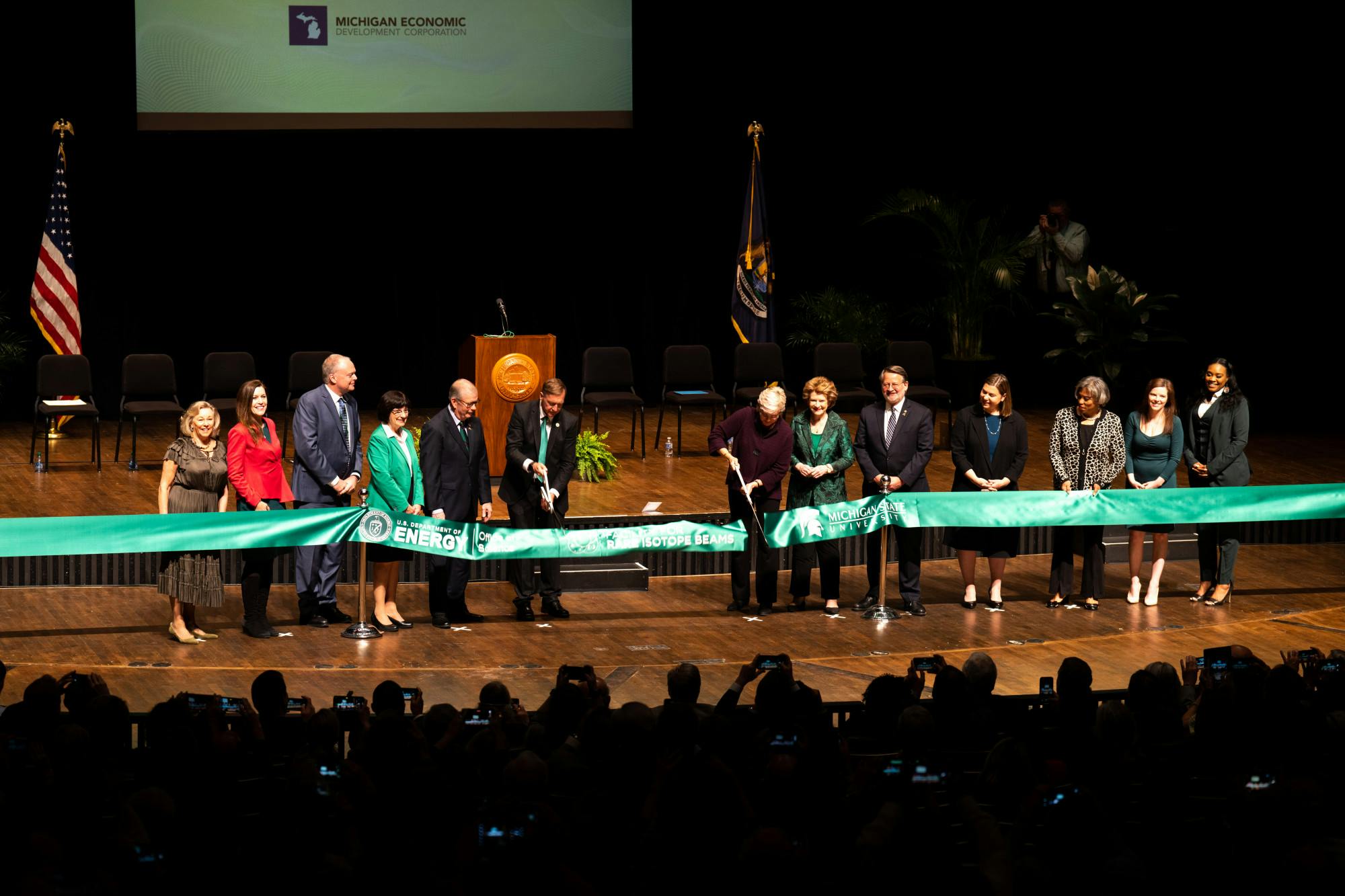Michigan State University held a ceremonial ribbon cutting to mark the official opening of the Facility for Rare Isotope Beams, or FRIB, this morning, May 2 at the Wharton Center.
The room was energetic and cheerful as government officials and MSU leaders gathered to celebrate the opening — Gov. Gretchen Whitmer, MSU Board Chairperson Dianne Byrum, U.S. Congressman Tim Walberg, FRIB Lab Director Thomas Glasmacher, MSU President Samuel L. Stanley Jr., U.S. Department of Energy Secretary Jennifer Granholm, U.S. Sen. Gary Peters, U.S. Sen. Debbie Stabenow, U.S. Congresswoman Elissa Slotkin and U.S. Congresswoman Brenda Lawrence all spoke at the event.
FRIB, a user facility for the U.S. The Department of Energy Office of Science, will hold what will be the most powerful heavy-ion accelerator. This accelerator will propel atoms to half the speed of light and will create collisions that produce rare isotopes.
“FRIB will do everything from expanding our understanding of the universe to advancing practical applications in medicine, nuclear security and environmental science,” Stanley said. "...It will help MSU continue to attract the best and brightest faculty, staff and students to our campus and into our natural science and engineering colleges and other programs.”
Stanley said FRIB will also support a community of 1600 scientists from around the world who will use the facility.
Previously, these rare isotopes were only found in the cosmos, but with FRIB’s technology, they will now be able to be produced on Earth.
Rare isotopes are versions of elements with a combination of protons and neutrons that do not hold together forever, according to the FRIB website. By producing these isotopes on Earth, scientists will be able to make numerous scientific discoveries and advancements in many different fields.
For example, rare isotopes may be used to research and develop new materials for pharmaceuticals, alternative energy and fuel sources. They can also be used for nuclear security research by allowing scientists to further understand nuclear reactions without weapons testing.
However, medicine has the most potential for impactful advancement. Doctors already use radioisotopes to find malignant cancer cells in PET scans, but the full potential of rare isotopes in seeking out and attacking certain cancers has yet to be explored. FRIB will allow scientists to make these discoveries and create advancements in using rare isotopes to track malignant cells.
The opening ceremony came 14 years after the U.S. Department of Energy first announced that MSU will be the host of FRIB, and 8 years after the groundbreaking initiated construction.
The facility was made possible through years of research, bipartisan support, government funding and lobbying.
“This FRIB is really the final step in the journey that began in 2008 and the beginning of a new chapter for Michigan's and MSU’s story,” Whitmer said.
MSU has been a leader in nuclear science for half a century, and FRIB only adds to its long list of nuclear accomplishments — MSU is already home to the National Superconducting Cyclotron Laboratory, a National Science Foundation user facility and the No. 1-ranked graduate program in nuclear physics.
“This is the place to be for students,” Stabenow said. “There will be no better opportunities to make a difference, to learn and to have a profound impact.”
Support student media!
Please consider donating to The State News and help fund the future of journalism.
Discussion
Share and discuss “Facility for Rare Isotope Beams opens with ribbon cutting ceremony” on social media.







